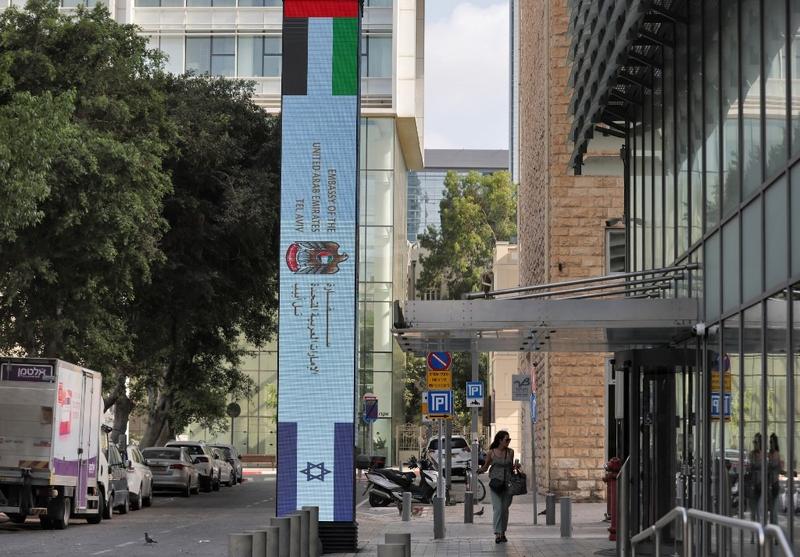 This picture taken on July, 12, 2021 shows a view of the sign marking the entrance of the United Arab Emirates' embassy at the Tel Aviv Stock Exchange building, also known as the Bursa, the Israeli Mediterranean coastal city. (EMMANUEL DUNAND / AFP)
This picture taken on July, 12, 2021 shows a view of the sign marking the entrance of the United Arab Emirates' embassy at the Tel Aviv Stock Exchange building, also known as the Bursa, the Israeli Mediterranean coastal city. (EMMANUEL DUNAND / AFP)
TEL AVIV - The United Arab Emirates on Wednesday became the first Gulf state to open an embassy in Israel, as its envoy hailed the trade and investment opportunities that closer ties would bring at a flag-raising ceremony also attended by Israel's president.
Sudan and Morocco have since also moved to establish ties with Israel
Brought together by shared unease about Iran, the UAE and Bahrain normalised relations with Israel last year under the "Abraham Accords" crafted by the administration of then-US President Donald Trump
Sudan and Morocco have since also moved to establish ties with Israel.
The opening of the UAE embassy, which is situated in the Tel Aviv Stock Exchange, followed the inauguration of Israel's embassy in the UAE last month.
"Since the normalisation of ties ...we have seen for the first time discussions on trade and investment opportunities," UAE ambassador Mohamed Al Khaja said, after raising his country's flag outside the building.
ALSO READ: Inaugurating embassy in UAE, Israel tells region: 'We're here to stay'
"We signed major agreements across various fields, including economy, air travel, technology and culture."
Israeli President Isaac Herzog called the opening of the embassy "an important milestone in our journey towards the future, peace prosperity and security" for the Middle East.
"Seeing the Emirati flag flying proudly in Tel Aviv might have seemed like a far-fetched dream about a year ago," he said. "In many ways nothing could be more natural and normal."
In the UAE last month to inaugurate Israel's temporary embassy in Abu Dhabi and consulate in Dubai, Israeli Foreign Minister Yair Lapid said bilateral trade since normalisation exceeded US$675 million and he expected more deals.
The regional rapprochement has been deplored by the Palestinians, who want their demands for statehood free of Israeli occupation addressed first.
The UAE has said last year's US-brokered accords, which challenged a decades-old allegiance to Palestinian ambitions as a major driver of Arab policy, would ultimately benefit the Palestinians.


